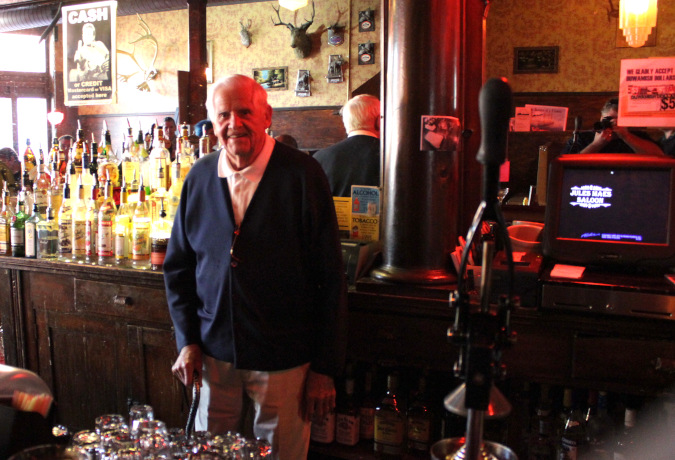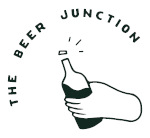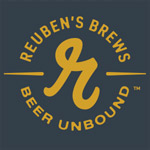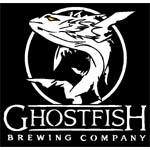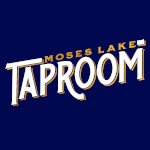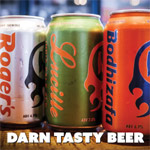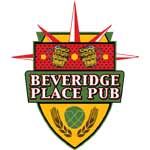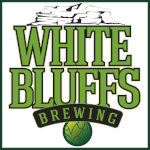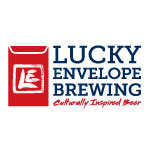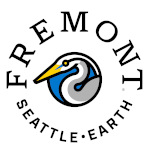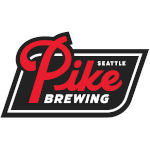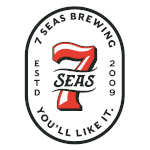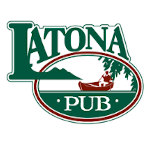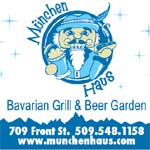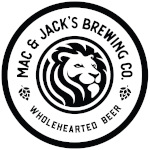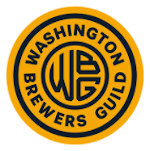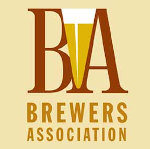Whether it is the oldest bar or not, Jules Maes Saloon is one of the Emerald City’s gems
I arrived at Jules Maes Saloon a few minutes early that day and told the bartender what was about to happen. I didn’t want her to freak out when a 92-year-old man walked through the front door, stepped behind the bar, and acted like he owned the place. That’s what Walter Maes did. (Photo above: Walter Maes taking his station behind the bar in 2012.)
It was a touching moment for the folks working at the Saloon that afternoon and especially poignant for Walter Maes’ son and granddaughter who were also there. On the day we spoke, Walter Maes was the last living member of the Maes family to have worked at the Saloon. Walter passed away in 2014, just two years after I interviewed him.
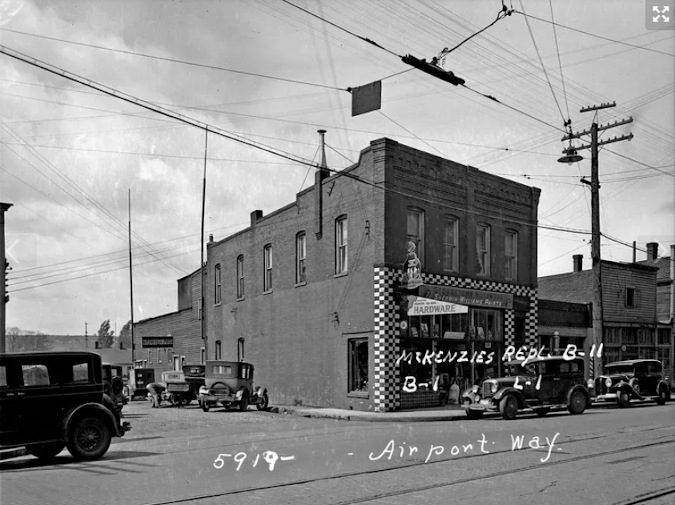
For some reason, something about Jules Maes Saloon has always intrigued me. I’ve read just about everything ever written about the place and asked a lot of questions over the years, so I was excited to speak with Walter Maes.
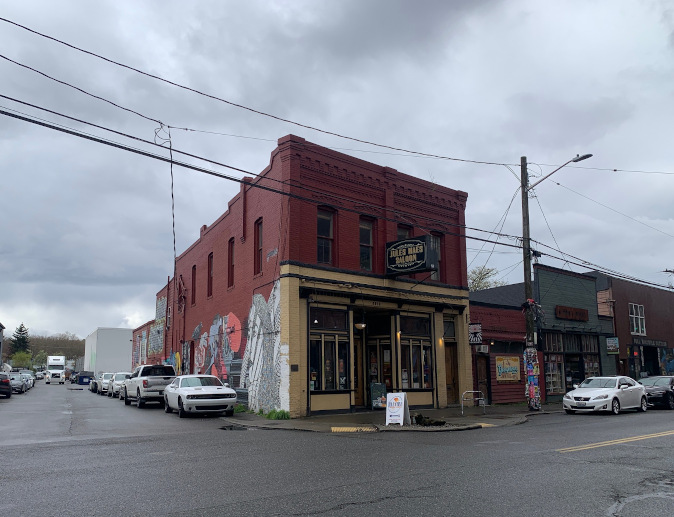
We headed down the hall past an ancient phone booth, and the bathrooms, to set ourselves up in the saloon’s backroom away from the crowd. One of the first questions I asked involved the age of the Saloon. Is it Seattle’s oldest bar? According to Walter, it is not. At least, not technically. When Prohibition ended, businesses like Jules Maes Saloon had to acquire new liquor licenses. On that joyful day in 1933, when the authorities issued the new licenses, “Uncle Remi was in line right behind the guy from Merchant’s Café.” But that is far from the beginning of the story for Jules Maes Saloon. (See the note below for information about the notion of “Seattle’s oldest bar.”)
Jules Maes – the man and his family
Jules Maes immigrated from Belgium to the United States in 1892 and soon ended up in Seattle. He worked as a bartender and a bar manager at various establishments south of Seattle, in parts of town we now refer to as Georgetown and South Park, which were still independent towns and enjoyed looser laws governing things like alcohol, gambling, and other forms of “sinful” behavior.
He was the eldest of 16 children and after several successful years in the new world, Jules returned to Belgium and convinced some of his siblings to follow him to the frontier. His brother, Remi Maes, eventually became a business partner and the day-to-day manager at the bar that would become Jules Maes Saloon.
The Rainier Bar and Jules Maes Saloon
Before becoming a bar owner, Jules Maes’ early work in Seattle included a stint as the manager of the notoriously dangerous and rowdy Maple Leaf Saloon. Jules bought the business in about 1906 and then sold it in 1912. That’s when he bought the Rainier Bar at 5953 Duwamish Avenue (now Airport Way). Jules Maes did not put his own name on the business until the early 1920s.
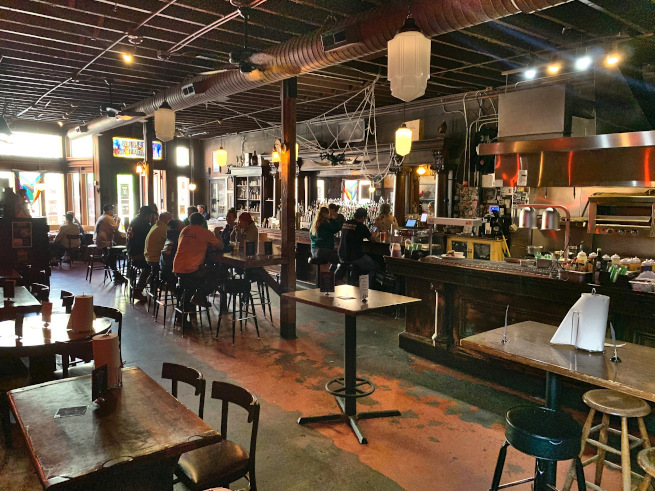
The Rainier Bar, which became the original Jules Maes Saloon, was across the street, just south of the saloon’s current home. These days, it’s Tinte Cellars’ tasting room. During Prohibition, the Rainer Bar/Jules Maes Saloon sold cigars, soft drinks, and meals. Apparently, not all of the drinks were soft.
Jules did not move the business to its current location until after Prohibition. The building that still houses Jules Maes Saloon was constructed in 1898 and was home to a restaurant, a grocery store, and a hardware store in the years before Jules turned it into a saloon. In the picture above from 1936, it was still a hardware store.
In 1937, Jules Maes moved his saloon across the street into the building still home to the business bearing his name. Jules Maes died in 1939. The business stayed in the family for 20-plus years thereafter.
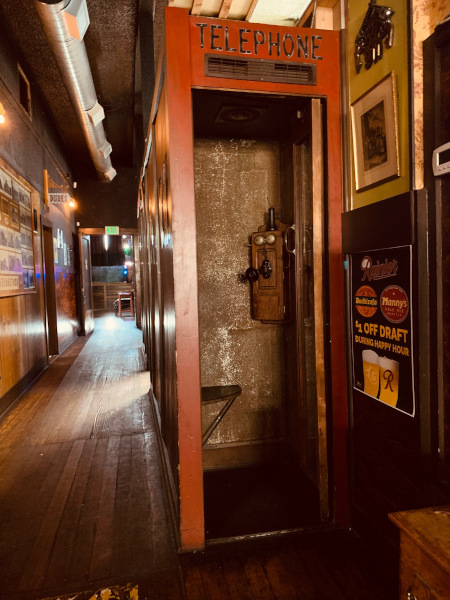
A Saint and a Scofflaw
Rumors and records suggest that Jules Maes was at odds with the concept of Prohibition (1917-1933). Was there a secret handshake that would get you a little something special from under the bar? I asked Walter Maes what he knew about the original Jules Maes Saloon serving alcohol during Prohibition. Proud of his family history, Walter said his Uncle Jules ran a legitimate business. “Oh, maybe some near beer, but that was legal,” Walter said.
I respected Walter’s desire to control the conversation about the bar that still has his family’s name above the front door. Truth is, the authorities fined Jules Maes more than once for selling spiked beverages during Prohibition. Also, for running illegal gambling operations. Around the time that Seattle annexed Georgetown (1910), he was part of an interesting lawsuit. A matter of public record, as they say. According to Seattle’s laws, too many bars were in the newly annexed neighborhood, and some had to go. Certain bars were paid to shut down. Jules Maes’ bar, Maple Leaf Saloon, was not one of those.
Walter Maes, the subject of my interview, was born in 1921 and was too young to have any real, first-hand knowledge of what happened during Prohibition and the years before. He spoke about his Uncle Jules with pride, telling me that hobos would come to the saloon’s back door during the Great Depression and always walk away with something to eat. He said Jules would not tolerate seeing children without shoes or proper clothing and always remedied the situation.
Walter’s stories echoed things I had read about Jules Maes, whom some folks called the Mayor of Georgetown. He was a generous man and was active in the community. Jules Maes, it seems, was a bit of a scofflaw. During Prohibition, he was far from alone.
Firsthand Accounts
Up to this point in the conversation, Walter Maes shared family history and family lore. I was interested in hearing firsthand stories about his time at the saloon. Walter said that when he returned to Seattle at the end of World War II he needed a job and that’s when he went to work at Jules Maes Saloon.
“When they brought me on, the union wanted their share,” Walter explained. A union for bartenders? Apparently so. “They wanted me to sign up for the union, but Uncle Remi wouldn’t have it. That made the union guys mad. I didn’t know anything about it at the time, they didn’t tell me about it, but I’d just got back from the service and I was done with people telling me what to do. I had enough of that during the war.”
“One night, a truck full of union guys came by and threw bricks through all of the front windows,” Walter said. “But they got the wrong place. They broke all the windows at The Cleveland!”
Walter said “The Cleveland” was another bar just a few doors down the street. Maybe it was where the Star Brass is located today? He pointed in that direction as he told the story. His uncle paid for those windows and told the police that Jules Maes Saloon was the intended target. “That ended that,” according to Walter. He sounded proud of his uncle.
The image of the Saloon that Walter Maes painted for me was a bit muddled and, to be honest, it seemed some of the history had been lost to time and some was being revised a bit. For example, Walter called the Saloon “A good, honest place where good men could stop and have a drink before going home to their families.” But he also told me at least one story more reflective of Jules Maes Saloon’s rough and rowdy reputation.
I asked Walter about the stories I’d heard involving illegal gambling. In particular, if the back room was ever used as a poker den. “No, nothing like that. Some of the guys would play pinochle, but no poker. One night, a guy came up to me and said that a fella was cheating on his ante, so I went back and told him he’d better straighten up. He took a swing at me, so I grabbed him and drug him to the front door and threw him out. He stumbled into the street and got hit by a bus. Broke his legs.”
I imagined there were many more stories like that to be told. More stories about “a good, honest place where good men could stop and have a drink before going home to their families.” Stories that would corroborate some of the more colorful things I’d heard about the Saloon.
Spooky Stuff
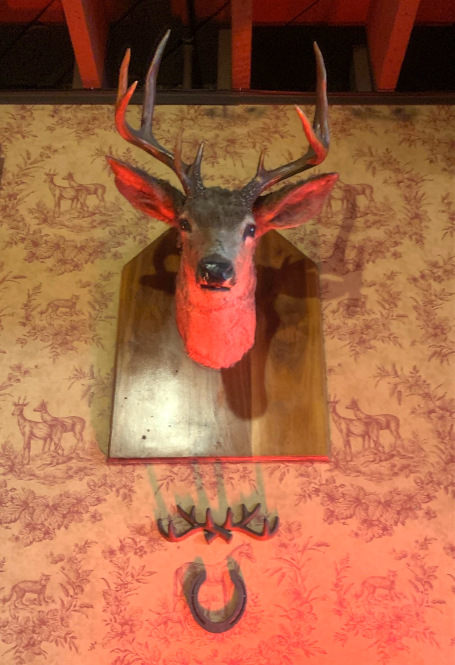
If I don’t tell you a ghost story, I’m not telling you the whole story. If you’ve spent enough time at Jules Maes Saloon or talked to the employees, you may have heard spooky stories. You might even have your own. Two different bartenders have shared stories with me over the years. One of those stories is relevant.
A bartender told me she was familiar with a ghost that sometimes “appeared” back by the bathrooms. She said it wasn’t something she could see so much as feel, but she somehow had the impression that it was a tall, slender man in a long coat and a hat. According to her, other folks sensed the same.
Asking Walter Maes about ghosts seemed like a stupid thing to do, so I didn’t. Instead, I asked if he could remember anyone who regularly hung out at the saloon, someone he would describe as tall and slender, and otherwise matched the bartender’s description.
“That sounds like Uncle Remi,” he said. “He was tall and skinny, wore overcoats and a fedora.” Remi Maes was the longtime, omnipresent manager at Jules Maes Saloon. Some might say he’s still there.
I asked Walter how Remi died. “It’s quite a story,” he said. “He went to a Husky football game with his friends and at half-time he told them he wasn’t feeling well. He got on a bus and came back to Georgetown. He told the bus driver to stop out front [of the Saloon]. There wasn’t a bus stop, but you could do that back then. He walked through the front door and collapsed. Heart attack.”
I brought a small tape recorder for my interview that day with Walter. The kind of recorder that journalists often use to help keep the facts straight. I’d used it many times before without trouble. It sat on the table between us and recorded our conversation. The next day when I played the tape back, a strange, whirring buzz masked our discussion. You could hear me and Walter talking but could not clearly understand much of what we said. I tested the recorder. It was fine. I have no explanation for the recorder’s malfunction that day.
I’m not superstitious, but whenever I walk into Jules Maes Saloon, I always say hello to Remi.
After the Maes Family and Beyond
The Maes family owned and operated Jules Maes Saloon into the 1960s. The business continued to operate under different owners until the 1990s. At some point, for a brief stint, the property served as a door manufacturing facility, which would have been an inglorious ending to the story if that were the conclusion.
When Wolf’s Door Company was ready to move out, around 1999 or 2000, I had the opportunity to tour the building. I was working with a group of potential investors who imagined reopening Jules Maes Saloon and creating a Washington beer history museum upstairs.
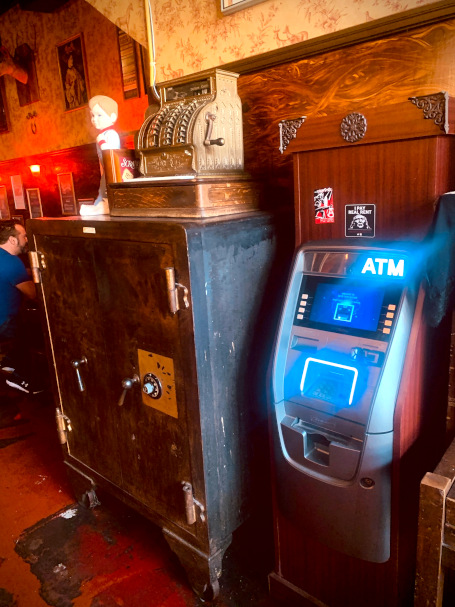
When I walked into the old building that day, I saw that the bar and back bar were still intact, though covered in sawdust. So too was the huge, old vault. The boot-warn brass foot rail beneath the bar, the smoke-stained wallpaper, everything was just as it had always been, but now there were table saws, planers, routers, and piles of wood in all the places where people should have been drinking and socializing. It was depressing.
Our plan was overly ambitious and never got off the ground. Happily, someone else stepped up, performed the necessary and costly upgrades to the building, and reopened Jules Maes Saloon. That was more than 20 years ago. The ownership has changed a couple times since then, but everyone seems committed to preserving the history of the place.
The more things change…
Back in the day, Seattle Malting and Brewing Company, the maker of Rainer Beer, was right across the street from Jules Maes Saloon. That brewery is long gone, but these days four craft breweries call Georgetown home, so you may still find local brewery workers at Jules Maes Saloon enjoying an after-work beverage alongside local artisans, industrial laborers, and even urban professionals. Everyone is welcome.
The bar focuses on cocktails and beer, including some local craft beers. The kitchen serves up hearty pub grub. Nothing too fancy, but everything is good. The back room, where I interviewed Walter Maes, is now an entertainment space that hosts live music, drag shows, and other forms of live entertainment. Leave the kids and the dog at home and dive deep into any or all of it.
Jules Maes Saloon is without question the oldest bar in Georgetown. It remains a valuable piece of Seattle’s history and I hope my telling of this story helps preserve that history for the ages. I am very thankful to Krista Maes (Crane) for kindly introducing me to her grandfather, Walter Maes. Like her grandfather, she is proud of her family’s place in Seattle history. As she should be.
Appendix: Seattle’s Oldest Bar
Within minutes or hours, all of the “oldest” bars in Seattle are the same age. It is safe to assume that every bar and restaurant in Seattle got its liquor license on or around that day in 1933 when Prohibition officially ended. Very few of those establishments still exist. Jules Maes Saloon, Merchant’s Café, and The Central Saloon might be the only ones that remain today.
According to Walter’s account, Jules Maes Saloon is, at best, Seattle’s second-oldest operating bar. If you include pre-Prohibition history, Merchant’s Café (est. 1890) and The Central Saloon (est. 1892) predate the arrival of Jules Maes in the Seattle area. None of those details diminish the fact that Jules Maes Saloon is an absolute gem. It is, without question, Georgetown’s oldest bar and is one of the city’s few bars with Pre-Prohibition roots.

